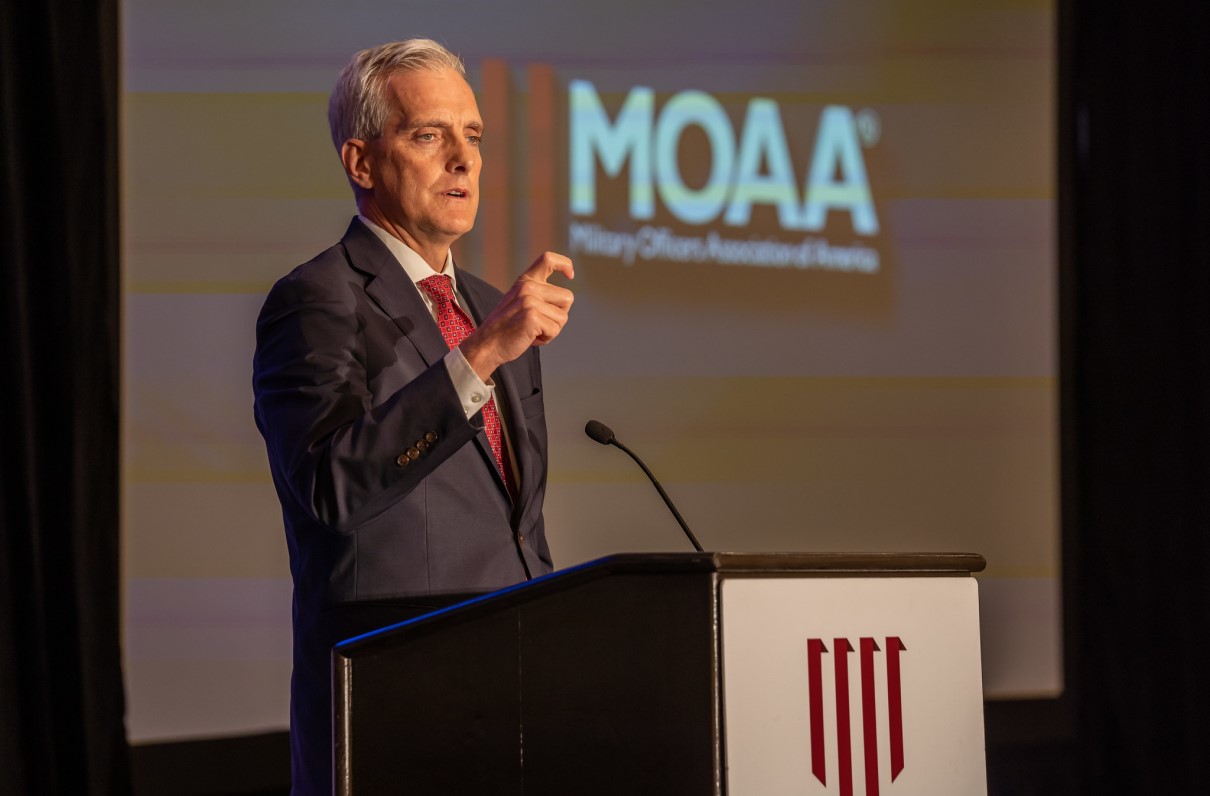(This article originally appeared in the February 2022 issue of Military Officer, a magazine available to all MOAA Premium and Life members. Learn more about the magazine here; learn more about joining MOAA here.)
VA Secretary Denis McDonough has been working on Capitol Hill for over 20 years — serving in roles with the House Foreign Affairs Committee and the National Security Council, as a foreign policy adviser, and as former President Barack Obama’s chief of staff. Combining this experience with his personal and professional background with the military, he seeks to take on toxic exposure reform and make it easier for veterans to contact VA.
The following interview conducted in late 2021 has been edited for length and clarity.
Q. Where do toxic exposure reform efforts stand?
A. Obviously, MOAA has been at the front of making sure that we make good on our pledges and our promises to our veterans who are exposed to toxic exposure. Over the course of the last several months, we’ve seen a couple of important innovations. One is we’re now implementing the three presumptives related to Agent Orange that Congress passed [in late 2020]. So, we are actively examining claims and adjudicating claims and making benefit payments now related to Parkinsonism and bladder cancer, for example.
We’re also making significant strides on toxic exposure in Southwest Asia, Uzbekistan, and Afghanistan. For the first time since the first Gulf War, we’re now paying claims for three diseases, which we’ve determined to be presumptively connected to service in those areas — rhinitis, sinusitis, and asthma. We expect as many as 300,000 claims. But importantly, we’re also looking at how we can expand the number of diseases that are presumptively covered ... [and determined] by service in that region.
[RELATED: VA Secretary Outlines Priorities, Initiatives at MOAA’s Annual Meeting]
Q. What do you see as the VA’s role in continuing to battle the pandemic?
A. Well, I see three things. One is we have to continue to get veterans who are not vaccinated at all yet, vaccinated. We have vaccinated about half of the eligible veterans, well over 3 million now. About half of the veterans who get all of their care from us have been vaccinated by us. But that still leaves room to grow.
[The] second thing is we have to execute on boosters. … And then the third is we have to be in a position to deal with the fallout from COVID. And that’s in two ways. One is on things like long COVID, which is a series of conditions that many survivors of COVID end up wrestling. We’re really leading the federal government’s effort on understanding and treating long COVID. The position to respond to is people who deferred care during the pandemic because they wanted to not go to a hospital or a clinic. So, we’re going to continue to be providing enhanced care for our veterans, who may have slightly more complicated or even significantly more complicated health situations because of deferred care.
[RELATED: VA Tests New Automated System That Could Speed Up Claims Decisions]
Q. What have you done to solicit feedback from veterans? How have you responded to their concerns?
A. We have a very active channel called V Signals where we’re constantly in touch with our veterans to hear what’s on their minds. We’re in the process of implementing the electronic health record, so that any individual servicemember from the time he’s enrolled to the time he becomes a veteran will have his medical record or her medical record travel along with that veteran.
We had a big question at the start of my tenure here at VA about deciding what portal we’ll use for the electronic health record. … I said, “I won’t decide that; our veterans will decide that.” So, we’ve been out in the field with veteran focus groups across the country, many of whom already use My HealtheVet portal at VA, to get their sense of the best way for us to establish a portal for the new electronic health record. So that’s a very concrete way that we’re talking to veterans and using their feedback to design products that are designed to serve our veterans.
[RELATED: VA Delays Electronic Record Rollout Amid COVID-Related Staffing Shortages]
Q. How can veterans service organizations like MOAA help VA achieve some of these priorities?
A. The main thing is to continue to be aggressive advocates for your members and for vets. It’s amazing to see how even in the context of the pandemic, MOAA’s advocacy work has not diminished at all. … So, continue to advocate for our vets, continue to advocate on Capitol Hill, and then continue to have this candid relationship that you have with us where you’re not only sharing good ideas, but holding us accountable.
Military Officer Magazine
Check out our award-winning monthly magazine. MOAA PREMIUM and LIFE members have access to all editions here.

